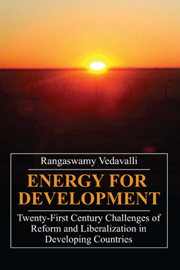 Energy for Development
Energy for Development Book contents
- Frontmatter
- Contents
- Abbreviations
- List of Tables
- List of Boxes
- Preface
- 1 The challenge of increasing access to energy for development
- 2 Changing global energy industry: implications for developing countries
- 3 Energy financing in developing countries in the pre-and post-1990s: towards energy sector reform and liberalization
- 4 Whither energy sector reform and liberalization in developing countries? A reality check
- 5 Energy sector reform and liberalization: case studies
- 6 Energy sector reform and liberalization and energy for the poor
- 7 Energy sector liberalization in developing countries: lessons and twenty-first century challenges
- 8 The way forward
- Bibliography
- Index
1 - The challenge of increasing access to energy for development
Published online by Cambridge University Press: 05 March 2012
- Frontmatter
- Contents
- Abbreviations
- List of Tables
- List of Boxes
- Preface
- 1 The challenge of increasing access to energy for development
- 2 Changing global energy industry: implications for developing countries
- 3 Energy financing in developing countries in the pre-and post-1990s: towards energy sector reform and liberalization
- 4 Whither energy sector reform and liberalization in developing countries? A reality check
- 5 Energy sector reform and liberalization: case studies
- 6 Energy sector reform and liberalization and energy for the poor
- 7 Energy sector liberalization in developing countries: lessons and twenty-first century challenges
- 8 The way forward
- Bibliography
- Index
Summary
This book studies the increase of access to affordable, efficient and reliable energy for development in the twenty-first century with special reference to non-OPEC developing countries. In doing so the book evaluates energy sector reform and liberalization experience since the 1990s in non-OPEC developing countries and the impact of events since 2001 (including the spiking of crude oil prices to US $60 barrel in June 2005).
Over 85 net Oil Importing Developing Countries (OIDC) began to reform their economies in some form or other in the 1990s. The guiding principles of energy sector reform in developing countries were part of the overall 1990s globalization framework of market transition for developing countries widely known as the ‘Washington Consensus’. It called for trade and financial liberalization, privatization, deregulation, openness to Foreign Direct Investment (FDI), a competitive exchange rate, fiscal discipline, lower taxes and smaller government.
In spite of the 1990s wave of globalization that prompted developing countries to liberalize and privatize their energy industry to finance the required investment for generating energy supplies for development, it is now clear that only a handful of developing countries were able to attract capital and grow rapidly. Also, in the initial years of the twenty-first century energy black-outs due to shortages of energy supplies for fuel development persist.
- Type
- Chapter
- Information
- Energy for DevelopmentTwenty-first Century Challenges of Reform and Liberalization in Developing Countries, pp. 1 - 18Publisher: Anthem PressPrint publication year: 2007


